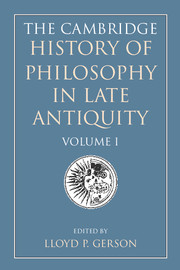Book contents
- Frontmatter
- General introduction
- I Philosophy in the later Roman Empire
- Introduction to Part I
- 1 The late Roman Empire from the Antonines to Constantine
- 2 The transmission of ancient wisdom: texts, doxographies, libraries
- 3 Cicero and the New Academy
- 4 Platonism before Plotinus
- 5 The Second Sophistic
- 6 Numenius of Apamea
- 7 Stoicism
- 8 Peripatetics
- 9 The Chaldaean Oracles
- 10 Gnosticism
- 11 Ptolemy
- 12 Galen
- II The first encounter of Judaism and Christianity with ancient Greek philosophy
- III Plotinus and the new Platonism
- IV Philosophy in the age of Constantine
- V The second encounter of Christianity with ancient Greek philosophy
- Map 1 The Byzantine Empire, c. 500
9 - The Chaldaean Oracles
from I - Philosophy in the later Roman Empire
Published online by Cambridge University Press: 28 May 2011
- Frontmatter
- General introduction
- I Philosophy in the later Roman Empire
- Introduction to Part I
- 1 The late Roman Empire from the Antonines to Constantine
- 2 The transmission of ancient wisdom: texts, doxographies, libraries
- 3 Cicero and the New Academy
- 4 Platonism before Plotinus
- 5 The Second Sophistic
- 6 Numenius of Apamea
- 7 Stoicism
- 8 Peripatetics
- 9 The Chaldaean Oracles
- 10 Gnosticism
- 11 Ptolemy
- 12 Galen
- II The first encounter of Judaism and Christianity with ancient Greek philosophy
- III Plotinus and the new Platonism
- IV Philosophy in the age of Constantine
- V The second encounter of Christianity with ancient Greek philosophy
- Map 1 The Byzantine Empire, c. 500
Summary
BACKGROUND
‘Chaldaean Oracles’ is a term used to refer to Greek dactylic hexameter poems, believed to have been spoken by the gods (especially Hecate), either directly to a figure known as Julian the Chaldaean or through a divinely possessed medium – perhaps Julian’s son, who later became known as Julian the Theurgist. The elder was reputed to have lived at the time of Trajan and the younger was said to have accompanied Marcus Aurelius on campaign, aiding him in battle by creating a mask that threw thunderbolts at the enemy, splitting stones by magical command, and conjuring up a rainstorm to save the army from dying of thirst. According to another legend, the younger Julian competed with Apuleius and Apollonius of Tyana to save Rome from a plague; Julian won by stopping it with a single word (St. Anast. Sinai, PG 89 col. 252ab).
Although the Oracles date to the late second or early third century ce, the term ‘Chaldaean’ is not applied to them until several centuries later (e.g., Proc. In Parm. 800.19) probably as an attempt to associate the poems and their messages with the much esteemed wisdom of the East. Earlier authors who quoted the Oracles generally referred to them as ta hiera logia or simply ta logia. The Oracles survive now only in approximately 226 fragments quoted by these later authors, including Proclus, Damascius and Michael Psellus (scholars disagree on whether all 226 fragments are genuinely from the Oracles or not). Porphyry, Iamblichus and Proclus also wrote commentaries on the Oracles, but these are lost; Iamblichus refers to the Oracles and probably even paraphrases them in his treatise Concerning the Mysteries.
- Type
- Chapter
- Information
- The Cambridge History of Philosophy in Late Antiquity , pp. 161 - 173Publisher: Cambridge University PressPrint publication year: 2000
- 1
- Cited by

